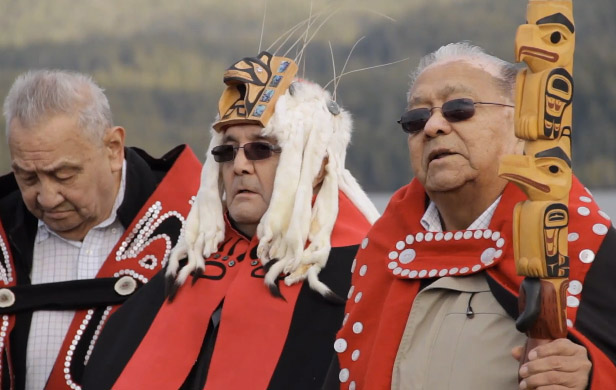
VANCOUVER – Following months of hearings, years of debate and dozens of protests, the federal panel reviewing the controversial Northern Gateway pipeline will release its report later today.
Much hangs in the balance.
The $6-billion pipeline that would connect the Alberta oilsands to tankers on British Columbia’s coast bound for the emerging markets of Asia has become the beachhead in the battle between economics and the environment.
If approved, the pipeline will likely be just the first to put billions of dollars into the coffers of Alberta, Ottawa and other provincial governments, not to mention the bank accounts of the proponent, Calgary-based Enbridge (TSX:ENB), and the international companies with a stake in the project.
“I would guess that in the early planning stages… they thought these were slam-dunks,” Marc Lee, an analyst at the left-leaning Canadian Centre for Policy Alternatives, says of Northern Gateway, Keystone XL and other pipeline projects now facing staunch opposition.
So, what went wrong? What didn’t.
The pipeline was always going to face an uphill battle west of the Rockies, in the province where the environmental movement was bolstered by the decades-old “War in the Woods” against old-growth logging.
Enbridge and the oil patch drastically underestimated the power of Green Corp., the older, wiser and better-funded modern version of the tye-dyed denizens who were arrested trying to save trees in the 1990s. Flush with cash from green philanthropists largely from south of the border, groups like Forest Ethics Advocacy, the Dogwood Initiative and Rising Tides have mounted a relentless campaign in Canada and abroad.
“Now, we could potentially see another ‘war in the woods’ over this pipeline,” Lee says.
Growing concern over climate change has been a factor.
Northern Gateway and other pipeline projects — the Keystone XL to the U.S. Gulf Coast, the reversal of Enbridge’s Line 9 through Ontario and Quebec, and Kinder Morgan’s proposed expansion of its Trans Mountain line to Metro Vancouver — mean production in the Alberta oilsands could as much as triple by 2035 and the greenhouse gases it emits along with it.
But while the global concern over greenhouse gas emissions may have spurred funding, protests in B.C. have been more of the grassroots, not-in-my-ocean variety.
There are also concerns that the heavy, molasses-like diluted bitumen coming from the oilsands is more corrosive and difficult to clean up in the event of a spill.
But perhaps the toughest hurdle for the project has been the simmering tension between B.C. First Nations and the federal government.
Unlike the rest of Canada, most First Nations in the westernmost province never signed treaties with the Crown. Decades of treaty negotiations have largely gone nowhere and aboriginal rights have been left to the courts.
Before Enbridge ever filed its application for the pipeline, Ottawa made the fateful decision to let the joint review of the National Energy Board and Canadian Environmental Assessment Agency stand for its duty to consult with First Nations.
“The federal government would not support a process for aboriginal consultation separate from the (joint review panel) process…,” said an internal Aboriginal Consultation Plan obtained by The Canadian Press using an Access to Information request.
That didn’t go well.
“We’re treated as a stakeholder in this process,” Carrie Humchitt, a lawyer for the Heiltsuk Nation, said as the panel hearings became increasingly adversarial earlier this year. “We are not just stakeholders. We have specific rights very different from other interest groups.”
Many aboriginal groups opposed to the pipeline refused to take part in the review. Several have indicated they are already preparing court action should the project get the nod.
“Even if the joint review panel says yes, and even if the Harper government says yes, I don’t think this is going to get built any time soon. This will be in courts for a really long time,” Lee says.
The political backlash was not limited to First Nations.
The Conservative government became defensive over oil patch expansion, with Natural Resources Minister Joe Oliver branding opponents “foreign special interests groups” that threatened to “hijack our regulatory system to achieve their radical ideological agenda.”
The government changed the rules to give cabinet the final say on the approval, and rewrote the rules around waterways and environmental protections.
It wasn’t until after the project was mired in controversy that Oliver announced rules that began to address some of the concerns around tanker and pipeline safety, and liability in the event of a spill.
Greg D’Avignon, president of the B.C. Business Council, says the outcome of the Northern Gateway project will shape B.C.’s future. Either the province will have a multibillion-dollar project or a reputation as the “no” province.
“The reality is whether you support this particular project or not, that culture is now building a bit of a reputation and we’re going to suffer the consequences in terms of our quality of life, our ability to fund education and health care if we don’t start to figure out how to get things done,” he says.
The demand for oil has not diminished, but it Canada can’t meet those needs the market will go elsewhere, he says.
There is disconnect in the public over the oil industry, D’Avignon says.
“Vancouver Island would shut down in three days if it weren’t for the oil barge that goes out of Burrard Inlet a couple times a week,” he says.
“So, we like the benefits of oil but we don’t want the ability to actually extract it, move it, sell it into the marketplace and create jobs from it.
“And we need to reconcile that, because even if we stopped using oil today, it would be 30 to 40 years before there would be alternative energy sources to pick up that demand in the market place.”
Despite the hurdles, the proponent remains optimistic.
Northern Gateway spokesman Ivan Giesbrecht says years of hard work went into the application, and the company believe it can build the safest pipeline in the world.
“It’s an important step for us, but it’s been a very thorough process by the joint review panel and we’re looking forward to the announcement.”

